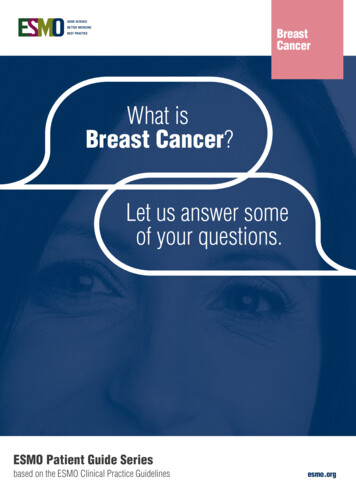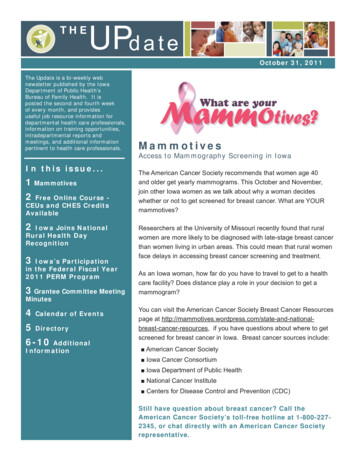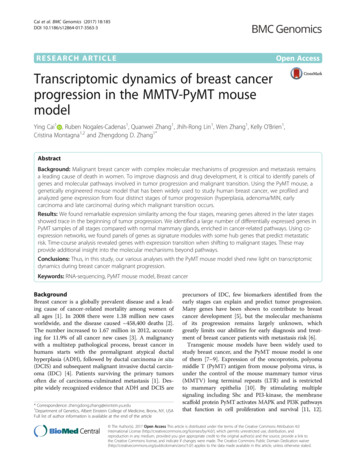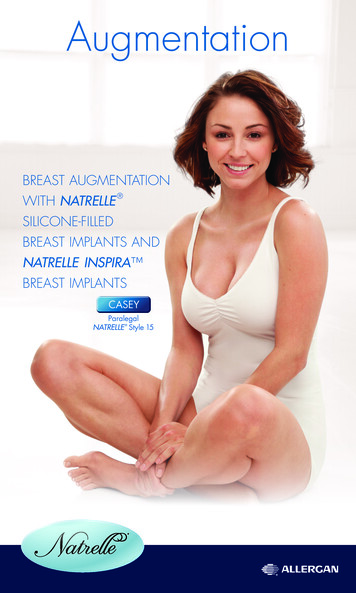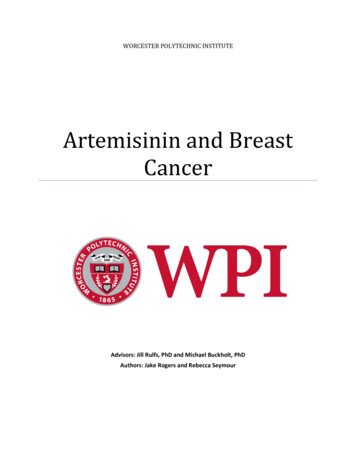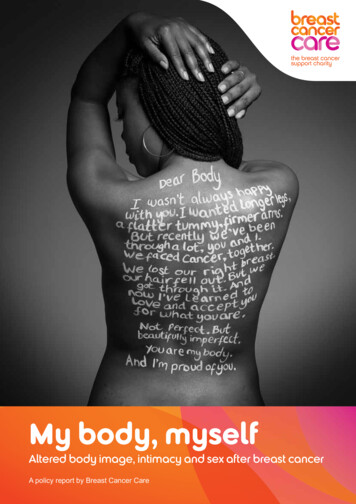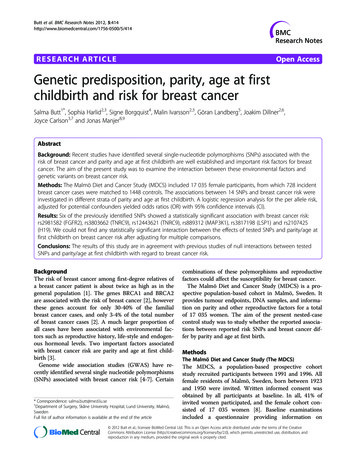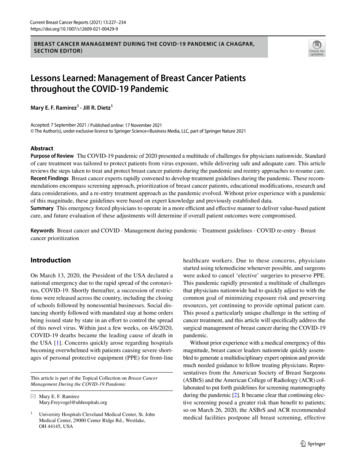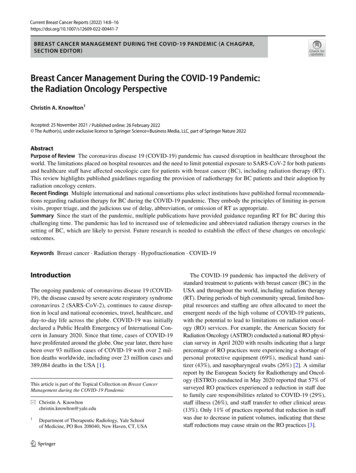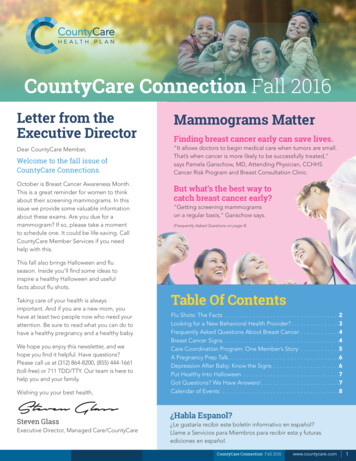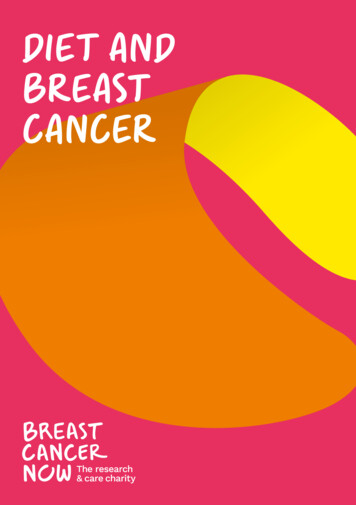
Transcription
DIET ANDBREASTCANCER
THIS INFORMATION IS BYBREAST CANCER NOW.Steered by our world-class research and poweredby our life-changing care, Breast Cancer Now ishere for anyone affected by breast cancer, thewhole way through, providing support for todayand hope for the future.Our breast care nurses, expertly trained staff andvolunteers, and award-winning information is allhere to make sure anyone diagnosed with breastcancer gets the support they need to help themto live well with the physical and emotional impactof the disease.For breast cancer care, support andinformation, call us free on 0808 800 6000or visit breastcancernow.org
Visit breastcancernow.org 3INTRODUCTIONKnowing what to eat during and after treatment for breastcancer can be difficult. You may have a loss or increase ofappetite, you may put on or lose weight, and food and drinkmight taste different to usual. In this booklet we look at how tomanage these changes and eat a healthy, balanced diet.Even though we’ve included a lot of information about followinga healthy lifestyle, it’s important not to feel guilty if you don’tstick to it all the time – especially while you’re coping with theother physical and emotional effects of breast cancer and itstreatment. It’s just about getting the balance right.You might hear lots of different theories and news storiesabout diet and cancer. This can be confusing, particularlywhen you’re trying to understand all sorts of other informationabout breast cancer and its treatment. We explain the evidencebehind some of these theories, and discuss whether diet andlifestyle can affect the risk of breast cancer coming back(known as recurrence).You can discuss any concerns with your doctor orbreast care nurse, or ask to be referred to a dietitian(a healthcare professional who assesses and treats dietaryand nutritional problems).WHAT IS A HEALTHY DIET?Eating healthily is important for everyone, but when you’ve hadbreast cancer you may become even more aware of what youeat and drink. A balanced diet has been shown to have a rangeof health benefits.The Eatwell GuideTo eat healthily, try to eat a variety of foods from each of thefour main food groups every day. The Eatwell Guide shows the
4 Call our Helpline on 0808 800 6000different types of foods you should eat and in what proportions.It recommends you: Eat at least five portions of a variety of fruit and vegetablesa day Base meals on potatoes, bread, rice, pasta or other starchycarbohydrates – choose wholegrain where possible Have some dairy or dairy alternatives – choose lower-fat andlower-sugar options, and check the label to make sure theycontain calcium Eat some beans, pulses, fish, eggs, meat and other protein –aim for at least two portions of fish every week, one of whichshould be oily, such as salmon or mackerelIn addition to this: Limit foods that are high in sugar Choose unsaturated oils and spreads and use insmall amounts Avoid eating foods that are high in salt or fat too often Limit alcohol as much as possible – have no more than14 units of alcohol a week and spread your drinking over atleast three days if you drink as much as this in a week(see page 19)Fruit and vegetablesPotatoes, bread, rice, pastaand other starchy carbohydratesOil andspreadsBeans, pulses, fish, eggs,meat and other proteinsDairy andalternatives
Visit breastcancernow.org 5Eating healthily doesn’t mean you can’t have any of the foods ordrinks you enjoy that might not be considered healthy, such asthose high in fat, salt and sugar. If you follow the Eatwell Guideyou can still enjoy these from time to time – it’s just aboutmaking sure you get the balance right.The Mediterranean diet is an example of a diet that contains abalanced mix of these food groups. It’s high in vegetables andfruits, and contains healthy fats such as olive oil.Hidden sugarsSome foods that seem healthy may contain a lot of sugar. Forexample, dried fruit contains much more sugar than fresh fruit.Alcoholic drinks and some diet foods may also have a highamount of sugar. It’s best to check the labels when consideringyour sugar intake.DIET DURING TREATMENTBreast cancer treatments can have a range of side effects,some of which may affect what you want to eat and drink.Your usual routine may be disrupted, which can affect youreating pattern. Going through a stressful and anxious timemay also affect your appetite, causing you to eat more orless than normal.Eating after surgeryMost people feel ready to eat again the day after surgery andfind their appetite returns to normal as the days go on. Eatingwell will help your body recover and heal.Effects of chemotherapyIt’s hard to tell how your body will react to chemotherapy. Youmay be able to eat normally throughout your treatment or theside effects may cause your eating habits to change.For more general information about chemotherapy and its sideeffects, see our Chemotherapy for breast cancer booklet.
6 Call our Helpline on 0808 800 6000Risk of infectionChemotherapy can cause a drop in white blood cells,which can increase the risk of getting an infection. You’llhave regular blood tests throughout your treatment tocheck your blood count. If you’re at an increased risk ofinfection, you may be advised to follow a specific diet.Your chemotherapy team will explain more about this ifnecessary.Follow good food hygiene when storing, preparing andcooking food. This is particularly important if you’re atincreased risk of infection.Changes to your appetiteTreatment for breast cancer may cause changes in yourappetite. If you have secondary breast cancer, your appetitemay be affected by treatment side effects or the cancer itself.If your appetite is small, or taste changes are affecting yourdiet, eating little and often can be better than facing a largemeal. It may help to: Eat five to six small meals or snacks each day instead ofthree bigger meals Drink milkshakes, smoothies, juice or soup if you don’t feellike eating solid food Do something active, if you feel able to, as exercise can helpincrease your appetite – for instance, you might have more ofan appetite if you take a short walk before lunch Be careful not to reduce your appetite by drinking too muchliquid before or during mealsFor more information about managing weight loss, see page 12.
Visit breastcancernow.org 7Some drugs given alongside chemotherapy, such assteroids, can increase your appetite. If you’re worriedabout gaining weight: Choose low-fat foods and drinks Eat plenty of fresh fruit and vegetables Watch out for the sugar content of food including some‘diet’ foods Avoid sugary drinksFor more information about managing weight gain, see page 11.Nausea and vomitingNausea (feeling sick) and vomiting (being sick) can be aproblem for some people during and after their chemotherapytreatments. Anti-sickness drugs can help with nausea andvomiting. Your chemotherapy team can help find one that worksfor you.Drink plenty of fluids, such as water or herbal teas. Takingfrequent sips is better than trying to drink large amountsin one go.Eating little and often can help if you’re feeling sick. Herbal teassuch as mint or ginger can also help settle the stomach.Some people find that eating cold food makes them feel lesssick because hot food can produce more of a smell.Sore mouthChemotherapy can make your mouth sore or dry, making ituncomfortable to eat.You might find it helpful to: Clean your teeth or dentures with a soft brush after eatingand floss gently Use an alcohol-free mouthwash (your chemotherapy teammay recommend one) Choose soft or liquid foods such as soups, stews, smoothiesand desserts
8 Call our Helpline on 0808 800 6000 Soothe your mouth and gums with ice cubes and sugar-freeice lollies Drink sugar-free fizzy drinks to freshen your mouth Use a straw to drink Avoid crunchy, salty, very spicy, acidic or hot foods Avoid citrus drinks like lemon, lime, orange andgrapefruit juiceIf you have dentures, clean them regularly and try not to wearthem all the time.Smoking and drinking alcohol can make a sore mouth worse.Taste changesYour taste may change during chemotherapy, making foodstaste bland or different. You may prefer to eat stronglyflavoured foods, and using herbs and spices in cooking mayhelp. Try a variety of foods to find the ones you like the best.As well as going off your usual foods, you may find that you likefoods that you previously did not like.Some types of chemotherapy can give you a metal taste in yourmouth. Using reusable plastic or wooden cutlery, instead ofmetal, can help reduce the metal taste. Using glass pots andpans to cook with can also help.ConstipationEating and drinking less than usual, being less active and takingcertain medications can all lead to constipation.Eating high-fibre foods can help if you’re constipated.These include: High-fibre breakfast cereal, such as bran flakes orshredded wheat Beans and lentils Vegetables (fresh or frozen) Brown rice Fresh, frozen, canned and dried fruit Wholemeal bread Wholewheat pasta
Visit breastcancernow.org 9Drink plenty of fluids (six to eight glasses of water a day) and dosome regular exercise such as walking.If you’re still having problems with constipation, ask yourtreatment team or GP for advice.DiarrhoeaOccasionally, some chemotherapy drugs can cause diarrhoea.Your GP or specialist can prescribe medication for diarrhoeaif necessary.Contact your chemotherapy team if you have four or moreepisodes of diarrhoea within a 24-hour period.Effects of radiotherapyHaving radiotherapy should not cause any dietary problems butit’s still good to eat a balanced diet and drink plenty of fluids.If you have to travel for your treatment, take a drink andsnack with you and plan meals that are easy to preparefor when you get home. See ‘Shopping and cooking duringtreatment’ opposite.Effects of hormone therapyWeight gainSome people who are having hormone therapy as part of theirbreast cancer treatment find their weight increases. Moreresearch is needed to understand why this is.You can find tips for losing weight on page 11.High cholesterolHormone therapy drugs such as anastrozole and letrozole canincrease the level of bad cholesterol in the blood.If you have too much bad cholesterol it can build upin the artery walls, leading to artery disease or otherhealth conditions.Following a healthy diet and maintaining a healthy body weight
10 Call our Helpline on 0808 800 6000can help to reduce your levels of bad cholesterol. Your doctorcan tell you more about how cholesterol levels are measuredand what dietary changes you may need to make.Shopping and cooking during treatmentSimple tasks like shopping and cooking can seem exhaustingduring your treatment and as you recover. Try to accept anyoffers of help, even if you’re used to coping on your own. Youcan also take advantage of online shopping or ask local shops ifthey have a telephone ordering and delivery service.It’s important to have fresh food in your diet, but if youcan't shop regularly, frozen and tinned fruit and vegetablesare full of nutrients and can be eaten every day. Choose tinnedfruit in juice rather than syrup and tinned vegetables that haveless salt.See our website breastcancernow.org/fatigue for moreinformation on coping with fatigue during and after treatment.Diets for other medical conditionsIf you’re already following a specific diet because you havea medical condition – such as diabetes, Crohn’s disease orirritable bowel syndrome (IBS) – having breast cancer doesn’tmean your diet has to change. However, if you’re concernedabout how your breast cancer treatment may affect your dietor any existing condition, talk to your breast care nurse ortreatment team. They can talk to a dietitian or other medicalstaff to ensure any existing condition remains under controlduring your treatment.
Visit breastcancernow.org 11HEALTHY EATING AFTER TREATMENTAfter treatment for breast cancer, you may have gained or lostweight, or you may want to know if diet can play a role in yourrecovery and future health.It can be helpful to speak with your GP or practice nurse. Theycan assess if your current weight is healthy. To do this they willmeasure your weight and height to calculate your body massindex (BMI). If your BMI is too high or low, they can help you puta plan together. They may refer you to a dietitian if they thinkthis would be helpful. They can also let you know about anylocal schemes aimed at helping people manage their weightand be more active.If you’ve put on weightWe usually put on weight when the amount of calories we eatis more than the amount of calories we burn through everydayactivities and exercise.Some people put on weight during and after treatment, whichcan be upsetting. This may be due to:The side effects of some drugs, which can increase appetiteThe body retaining fluidBeing less active than usualOvereating when you’re anxious or because your usual routinehas changed The menopause (as a result of your treatment) How to lose weight safelyIf you need to lose weight after treatment, aim for a realisticweight loss of about 0.5–1kg (1–2 pounds) a week.
12 Call our Helpline on 0808 800 6000The only way to lose weight healthily and keep it off is tomake some permanent changes to the way you eat andexercise. Try to: Reduce your portion sizes – using a smaller plate can helpEat at least five portions of fruit and vegetables a dayChoose wholegrain varieties of bread, pasta and cerealsUse lower-fat dairy foods, such as skimmed or semi-skimmedmilk or lower-fat cheese such as feta, reduced-fat cheddar orcottage cheeseGo for lean cuts of meat and trim off as much fat as possibleInclude beans and pulses in your dietLimit the amount of alcohol you drinkLimit the amount of biscuits, cakes, chocolate and crispsChoose healthier options when eating out and remember thattakeaways can be high in fat and caloriesSome people find the support from a local weight loss schemeor club helpful.As well as eating a healthy diet, you should also try to dosome regular, moderate-intensity exercise. You can find moreinformation about physical activity during and after breastcancer on our website.The NHS has developed a 12-week weight loss programmein association with the British Dietetic Association. Your GPcan tell you more about this, or you can download the guideand find out more about weight loss at nhs.uk/live-well/healthy-weightSome pharmacies offer a free weight management serviceto assess your weight and give you appropriate adviceand support.If you’ve lost weightIf you’ve lost weight during your treatment, some simplechanges to your diet can help. To put on weight in a healthyway, you need to eat more calories and more protein. Aim toeat three meals and some snacks throughout the day, basedon the Eatwell Guide (page 3). Have more of the protein-rich
Visit breastcancernow.org 13foods like lean cuts of meat, fish, eggs, nuts, seeds and pulses(such as lentils and beans). Also include healthy fats such asavocados, olive or rapeseed oil, and unsalted peanut butter.Adding milk powder or protein powder to drinks or food mayalso help.Your GP can prescribe high-protein or high-energy drinks andsoups if you need extra help to gain weight, or they may referyou to a dietitian.Bone healthFor some people, treatments such as chemotherapy orhormone therapy can affect bone health. This can increasethe risk of osteopenia or osteoporosis, conditions that affectthe bones.It’s important to get enough calcium from your diet as calciumis vital for healthy bones.Good sources of calcium include: Milk and dairy products (including low-fat varieties) such asyoghurt, fromage frais and cheese Calcium-fortified breakfast cereals Dried fruit such as apricots and figs Fish with edible bones including anchovies, sardines,pilchards and whitebait, or canned fish that contains softbones such as tinned salmon Green leafy vegetables like broccoli, watercress andcurly kale Pulses, beans and seeds such as kidney beans, greenbeans, baked beans and tofu (a vegetable protein madefrom soya beans) Nuts and seeds such as almonds, brazil nuts, hazelnuts andsesame seeds Okra
14 Call our Helpline on 0808 800 6000Vitamin D is needed to help your body absorb calcium. Themain source of vitamin D is sunlight. You can also get vitamin Dfrom some foods. Good food sources of vitamin D include: MargarineLow-fat spreadsEgg yolksOily fish such as herrings and sardinesVitamin D-fortified breakfast cerealsYour GP may recommend a calcium or vitamin D supplement.For more information on looking after your bones during andafter treatment, see our Osteoporosis and breast cancertreatment booklet.SupplementsIf you’re finding it difficult to get essential nutrients or vitaminsfrom your diet alone during or after treatment, your GP mayprescribe a dietary supplement. For example, if your bonehealth has been affected they may prescribe a calcium orvitamin D supplement.However, unless you’re having problems recovering fromtreatment, supplements are not needed.Herbal productsSome people wonder whether certain herbal products mighthelp, for example with the side effects of treatment. However,there’s conflicting evidence about the safety or effectiveness ofsome herbal products, and some may affect how certain cancertreatments work. Talk to your specialist, GP or a dietitian beforetaking them.For more information on herbal medicines, see ourComplementary therapies, relaxation and wellbeing booklet.You can also find information about herbal medicine on theSloane Kettering website mskcc.org
Visit breastcancernow.org 15CAN DIET AND LIFESTYLE AFFECT THERISK OF CANCER COMING BACK?You may have heard that diet and lifestyle can affect the risk ofbreast cancer coming back (recurrence).The World Cancer Research Fund (WCRF) recommends thatpeople who have had breast cancer follow advice to reducetheir risk of cancer coming back. This includes eating a healthydiet that is high in fibre and low in saturated fats, beingphysically active, maintaining a healthy weight and limitingalcohol (if consumed at all).DietHigh-fibre foodsThere is some evidence that fibre may reduce the risk ofbreast cancer recurrence but further research is needed tofind out more.High-fibre foods tend to be lower in calories and can helpyou feel full up for longer. Experts think fibre has many healthbenefits including improving digestive health and helping toprevent heart disease and some cancers.High-fibre foods include: Wholegrain foods such as brown rice, oats, wholewheatcouscous and quinoa Pulses such as lentils and beans Starchy foods such as potatoes and sweet potatoes,preferably with their skins on Vegetables and fruits
16 Call our Helpline on 0808 800 6000Saturated fatsAs with fibre, there is some evidence that saturated fat mayaffect the risk of recurrence, but again further research isneeded to find out more.It’s a good idea to limit the amount of fat you eat, particularlysaturated fat, because it increases the risk of conditions suchas heart disease.Foods that are high in saturated fat include:ButterFatty cuts of meatProcessed meats such as sausagesFull-fat dairy products, including whole milk, cream andhard cheese Chocolate, biscuits and cakes Try to replace these with healthier unsaturated fats found infoods such as: Olive oil, rapeseed oil and spreads made from these oilsOily fish such as salmon and mackerelAvocadosNuts and seedsIf you’re having foods that contain saturated fats, chooseones with lower saturated fats. For example, choose lower-fatdairy products such as skimmed milk, low-fat yoghurts andlower-fat cheese such as feta, and leaner meats suchas chicken and turkey.
Visit breastcancernow.org 17Soya and foods that containphytoestrogensSoya foods such as soya milk and tofu contain naturalcompounds called phytoestrogens. Foods like chickpeasand linseeds also contain phytoestrogens.Phytoestrogens have a chemical structure that is similarto the hormone oestrogen. As oestrogen can stimulatesome breast cancers to grow, some people worry whetherfoods or supplements containing phytoestrogens mighthave the same effect as oestrogen and increase the riskof recurrence.Current evidence suggests that a diet containing naturallyoccurring phytoestrogens is safe if you’ve had breastcancer and may be beneficial.Phytoestrogens are also found in herbal remedies likeblack cohosh, red clover and sage, which are sometimestaken to relieve hot flushes and other menopausalsymptoms. However, these are not recommended becausethe evidence on their effectiveness and safety is limitedand conflicting.Organic foodsSome people choose to eat organic foods as a way of reducingpesticides in their diet. However, no association has been foundbetween eating an organic diet (before or after diagnosis) andthe risk of breast cancer recurrence.SuperfoodsThe term ‘superfood’ has been used to describe foods thatare apparently beneficial for preventing or treating a range ofhealth conditions. So-called ‘superfoods’ include blueberries,raspberries, green tea and broccoli.
18 Call our Helpline on 0808 800 6000There is no evidence that any single food can reduce the risk ofbreast cancer developing or coming back in someone who hasbeen diagnosed.Special ‘cancer diets’Some people who have had breast cancer consider following aspecial diet. This may be because they believe it could reducethe risk of recurrence. These diets often encourage eating oravoiding certain types of food.There’s no conclusive evidence that they reduce the risk ofbreast cancer recurrence.Special diets can often be very restricting, expensive and cansometimes lead to a lack of nutrients. This may result in otherconditions such as anaemia (too few red blood cells in thebody), or bone conditions such as osteopenia or osteoporosis(see page 13).If you’re thinking about changing your diet or want to find outmore about different diets, you may find it helpful to talk toyour treatment team or a dietitian. You might also want tocontact some of the organisations listed at the end of thisbooklet for more information.The Bristol Whole Life Approach to healthy eatingThe Bristol Whole Life Approach to healthy eating is a set ofdietary guidelines for people living with and beyond cancer.The guidelines mainly focus on eating foods that have not beenaltered. For example, they suggest brown rice instead of whiterice. They also recommend including a range of different colourvegetables and fruit in your diet. Animal products are permittedin small amounts.The Bristol Whole Life Approach to healthy eating aims to helppeople eat healthily and cope better with the physical andemotional impact of cancer. However, there is no evidence thatfollowing these recommendations will reduce the risk of breastcancer recurrence.
Visit breastcancernow.org 19The recommendations were developed by Penny Brohn UK. See‘Useful organisations’ on page 21.Dairy-free dietSome people with breast cancer are concerned about eatingdairy foods and believe that following a dairy-free diet willreduce their risk of recurrence.In a dairy-free diet, dairy foods are avoided altogether and arereplaced with non-dairy alternatives such as soya products, andalmond, coconut and rice milks.There’s no conclusive evidence that following a dairy-freediet will reduce the risk of recurrence. As dairy foods are oneof the main sources of calcium it’s still important to includenon-dairy foods that contain the calcium the body needs. See‘Bone health’ on page 13 for examples of foods that are highin calcium.Macrobiotic dietA macrobiotic diet is high in wholegrains and low in fat andprotein. There are different types of macrobiotic diets and someare stricter than others. They may also include guidelines onhow food is prepared, your lifestyle and environment.This diet can be strict and is often low in calories, calcium,iron, B vitamins and other nutrients, so may not be suitable andcould possibly be harmful. Speak to your dietitian or treatmentteam for advice.AlcoholStudies have shown drinking alcohol increases the risk ofgetting breast cancer. It’s less clear if drinking alcohol affectsthe prognosis (outlook) of breast cancer.NICE (National Institute for Health and Care Excellence)recommends that people who’ve had breast cancer limit theiralcohol intake to below 5 units a week.
20 Call our Helpline on 0808 800 6000You can find out how many units are in your drinks by using anonline unit calculator. As a general guide: Half a pint of average-strength (4%) beer 1 unit A 175ml glass of wine (12.5%) 2 units A single 25ml measure of spirits (40%) 1 unitIt’s worth bearing in mind that alcohol is also high in calories.SmokingThere is emerging evidence that smoking may affect the risk ofbreast cancer recurrence but further research is needed to findout more.We know smoking causes a range of health conditions. If youwant to stop smoking there are programmes that can help.Speak to your pharmacist, GP or practice nurse for advice.Physical activityPhysical activity may reduce the risk of recurrence but furtherresearch is needed to find out more.Regular physical activity can help improve your long-termhealth, and has been shown to reduce the risk of healthconditions such as heart attacks, strokes and some cancers.See our website for more information on physical activity afterbreast cancer treatment.DIET AND SECONDARYBREAST CANCERIf you have secondary breast cancer, any treatment and thecancer itself can have an effect on diet, particularly appetiteand taste changes. You can read more about this in ourSecondary breast cancer information pack.
Visit breastcancernow.org 21USEFUL ORGANISATIONSBritish Association for Applied Nutrition & NutritionalTherapy (BANT)Website: bant.org.ukTelephone: 01425 462 532Provides a national register of nutritional therapypractitioners.British Dietetic Association (BDA)Website: bda.uk.comAdvice on finding a dietitian who is appropriately trainedand qualified.British Nutrition FoundationWebsite: nutrition.org.ukTelephone: 020 7557 7930Provides impartial, evidence-based information on foodand nutrition.NHS behind the headlinesWebsite: nhs.uk/newsProvides an unbiased and evidence-based analysis ofhealth stories that make the news.
22 Call our Helpline on 0808 800 6000NHS LivewellWebsite: nhs.uk/live-wellOffers tips on eating healthily, losing weight andphysical activity.Penny Brohn UKWebsite: pennybrohn.org.ukHelpline: 0303 300 0118Offers courses and information for people with canceras part of their ‘Bristol Whole Life Approach’ programme.They provide practical tips on healthy eating and exercise,and managing uncertainty and anxiety.Royal Osteoporosis SocietyWebsite: theros.org.ukHelpline: 0808 800 0035Provides a range of booklets and online information aboutosteoporosis. They also have a Helpline staffed by nurseswith specialist knowledge of osteoporosis.Smokefree NHSWebsite: nhs.uk/smokefreeSmokefree is a campaign launched by Public HealthEngland to help people to quit smoking. They offersupport through their Smokefree app, Quit Kit, email, SMSand face-to-face guidance.
Visit breastcancernow.org 23Walking for HealthWebsite: walkingforhealth.org.ukRun in partnership by the Ramblers and Macmillan CancerSupport, Walking for Health offer free, short, local healthwalks across England to help more people, includingthose affected by cancer, discover the joys and healthbenefits of walking.World Cancer Research FundWebsite: wcrf-uk.org/ukIncludes information for people living with and beyondcancer on reducing the risk of their cancer coming back.
FOUR WAYS TO GET SUPPORTWe hope this information was helpful, but if you havequestions, want to talk to someone or read moreabout breast cancer, here’s how you can.Speak to our nurses or trained experts. Call our freeHelpline on 0808 800 6000 (Monday to Friday 9am–4pm and Saturday 9am–1pm). The Helpline can alsoput you in touch with someone who knows what it’slike to have breast cancer.Chat to other women who understand what you’regoing through in our friendly community, for supportday and night. Look around, share, ask a question orsupport others at forum.breastcancernow.orgFind trusted information you might need tounderstand your situation and take control ofyour diagnosis or order information booklets atbreastcancernow.orgSee what support we have in your local area. We’ll giveyou the chance to find out more about treatmentsand side effects as well as meet other people like you.Visit breastcancernow.org/in-your-area
SUPPORT FOR TODAYHOPE FOR THE FUTUREWe believe that we can change the future of breast cancer and make sure that, by2050, everyone diagnosed with the disease lives – and is supported to live well.But we need to act now.If you found this booklet helpful, use this form to send us a donation.Donate onlineDonate using your debit or credit card breastcancernow.org/donateDonate by postPlease accept my donation of 10/ 20/my own choice of I enclose a cheque/PO/CAF voucher made payable to Breast Cancer NowNameAddressPostcodeEmail addressTelephoneKeeping in touch with Breast Cancer NowWe'd like to tell you ways you can help further, including through donating,fundraising, campaigning and volunteering, and send you updates on ourresearch, the support we provide, breast health information and our widerwork to achieve our aims.If you already hear from us, we will continue to contact you in the same way.If you don't already hear from us, please tick the box if you are happy to becontacted by:EmailMobile messagingPlease return this form to Breast Cancer Now, Freepost RTSC-SJTC-RAKY,Fifth Floor, Ibex House, 42–47 Minories, London EC3N 1DYHow we use your informationFrom time to time, we may contact you by telephone and post to keep youupdated on our work and ways you can help. You can change the way you hearfrom us at any time by emailing us at supporterengagement@breastcancerno
to live well with the physical and emotional impact of the disease. For breast cancer care, support and information, call us free on 0808 800 6000 . eat and drink. A balanced diet has been shown to have a range of health benefits. The Eatwell Guide To eat healthily, try to eat a variety of foods from each of the .
